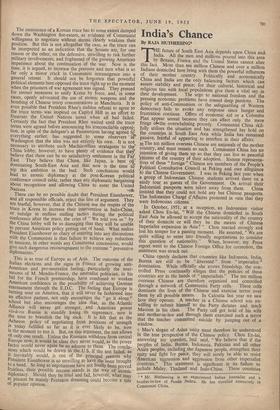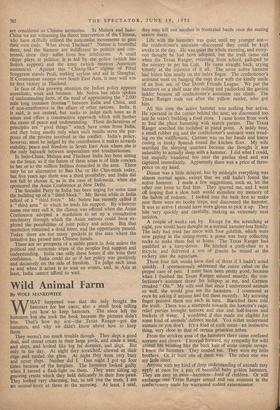India's Chance
By RAJA HUTHEESINGs THE future of South East Asia depends upon China and India. All the men and millions poured into this area by Britain, France and the United States cannot alter this fact. More than ten million Chinese and over a million Indians domiciled here bring with them the powerful influences of their mother country. Politically and economically China and India are the only balancing factors which can assure stability and peace; for their cultural, historical and religious ties with local populations give them a vital say in their development. The urge to national freedom and the pressing economic problems have roused deep passions. The policy of anti-Communism or the safeguarding of Western democracy fails to evoke any response since hunger and frustration continue. Offers of economic aid or a Colombo Plan appear unreal because they, can affect only the mere fringe of4the overwhelming poverty. Communist China skil- fully utilises the situation and has strengthened her hold on the countries, in South East Asia while India has remained passive, fearful of appearing to interfere in their affairs.
at The ten million overseas Chinese are nationals of the mother country, and must remain as such. Communist China has no intention of giving them up so that they can live as peaceful "pitizens of the country of their adoption. Sixteen representa- tives of these " foreign " Chinese are members of the People's Political Consultative Council at Peking and owe allegiance to the Chinese Government. I was in Peking last year when . a group of Indonesian Chinese students arrived there on a study tour as guests of the Government. On arrival their Indonesian passports were taken away from them. China insisted that they could not hold any but Chinese passports. The Indonesian Charge d'Affaires protested in vain that they were Indonesian citizens.
In October, 1951, at a reception, an. Indonesian visitor asked Chou En-lai, " Will the Chinese domiciled in South East Asia be allowed to accept the nationality of the country of their domicile or will they be the means of Chinese imperialist expansion in Asia? " Chou reacted strongly and lost his temper for a passing moment. He asserted, " We are quite willing to enter into friendly negotiations to consider this question of nationality." When, however, my Press report went to the Chinese Foreign Office for correction, the statement was struck out.
China openly declares that countries like Indonesia, India, Burma are still to be " liberated " from " imperialist " domination. While officially she avows friendship, the con- trolled Press continually alleges that the policies of these countries are in the hands of " imperialists." The ten million overseas Chinese are therefore, organised and controlled through a network of Communist Party cells. These cells dominate the lives of the Chinese and exercise terror over them by all possible means. In Calcutta last year we saw how they operate. A teacher in a Chinese school was un- willing to submit himself to the Party dictates and teach Maoism in his class. The Party cell got hold of his wife and mother-in-law and through them exercised such a terror that the teacher committed suicide by jumping out of a window.
ti' Mao's slogan of Asian unity must therefore be understood in the true perspective of the Chinese policy. Chou En-lai, answering my question, had said, " We believe that if the peoples of India, Burma, Indonesia, Pakistan and all other Asian peoples, including the Japanese people, strengthen their tipity and fight for peace, they will surely be able to resist 4merican aggression and aggression from other imperialist countries." This statement is significant in its failure to include Malay, Thailand and Indo-China. These countries * Mr. Hntheesing is an experienced Indian journalist and a brother-in-law of Pandit Nehru. He has travelled extensively in Communist China. are considered as Chinese territories. In Malaya and Indo- China we are witnessing the direct intervention of the Chinese, who have skilfully utilised the nationalist movements to gain their own ends. What about Thailand? Nature is bountiful there, and the Siamese are indifferent to politics and con- tented, since they suffer from few inhibitions. A small clique plays at politics; it is led by the police (which has British support) and the army (which receives American assistance). Against this "Chiang-like " regime of Pibul Songgram stands Pridi, seeking asylum and aid in Shanghai. If Communism sweeps over South East Asia, it may well win its first victory in Thailand. In face of this growing situation the Indian policy appears unrealistic, weak and hesitant. Mr. Nehru has often spoken of understanding facts, of the need of appreciating the " 2,000 mile long common frontiou " between India and China, and of non-interference in the affairs of other nations. India, it is said, is not neutral, but seeks to judge each issue as it arises and offers a constructive approach which will further the cause of peace and understanding. These declarations of principles are good things " which have come from India, and they bring results only when such results serve the pur- poses of the powers involved in the conflict. India's policy, however, must be judged by the contribution it makes towards stability, peace and freedom in South East Asia where she is the only bulwark between imperialism and totalitarianism. In Indo-China, Malaya and Thailand India has been sitting on the fence, as if the future of these areas is of little concern to her or to the million Indians domiciled in the area. There may be no alternative to Bao Dai or Ho Chin-minh today, but five years ago there was a third possibility, and India did not fail to choose it., as in the case of Indonesia, when she sponsored the Asian Conference at New Delhi. The Socialist Party in India has been urging for some time the building up of a third block." Mr. Bevan while in India talked of a " third force." Mr. Nehru has recently called it a " third area " to which he lends his support. By whatever name one may call it, the chance was offered when the Asian Conference adopted a resolution to set up a consultative machinery through which the Asian nations could have ex- plored the possibilities of joint policy and action. But that resolution remained a dead letter, and the opportunity passed. Today there are too many pockets in this area where the initiative has passed into Chinese hands. There are no prospects of a stable peace in Asia unless the political and economic urges of the peoples find support and understanding. India can rally these forces if she wins their confidence. India could do so if her policy was positively and decisively on the side of freedom. To judge each issue as and when it arises is to wait on events, and, in Asia at least, India cannot afford to wait.



















































 Previous page
Previous page